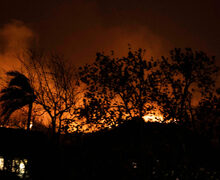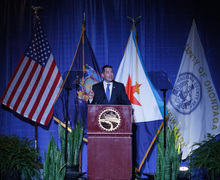Roth: Hydroelectric dams threaten access to water, way of life for Mapuche people
Five rows of a dozen metal chairs lined up toward a projection of breathtaking landscapes from the Mapuche people’s territory in the south of Chile.
A handful of organizers and about five viewers apart from my friend and I filled the small room in the back of a used bookstore to watch the independent documentary “A Broken Cycle.” With Columbus Day on Monday, this event reminded everyone about the struggles indigenous people face since Columbus’ infamous founding of the New World.
Quickly, the documentary changed from beautiful scenery to harsh reality. The interviews with Mapuche leaders and sights of protests showed the grave conflict facing the natural beauty that the indigenous people call home — hydroelectric dams.
The south of Chile, home to Patagonia, is a rainy, beautiful region filled with lakes. All of these lakes create good conditions for hydroelectric dams to generate energy. However, creating these dams means flooding valleys. This threatens the access to water and the way of life of the Mapuche people, who are already at the bottom of the totem pole in Chilean social society.
Juana Calfunao Paillaléf, the lonko, or chief, of a Mapuche village in the south, made a short speech after to emphasize the major points of the documentary. Wearing her hair in two braids, she wore the traditional dress and jewelry of the Mapuche.
The lonko invited me to this event after I first met her on Friday. Paillaléf, anthropology students from the University of Chile and Mapuche activists were holding a meeting at my host family’s house. My host sister works with the lonko in her activist mission.
Paillaléf is from a Mapuche village in the south of Chile and has been protesting the dams. She wrote an open letter to the president last year. Also, my host father said she is the only woman lonko in the Mapuche nation.
A main concern of the Mapuche is their access to clean water. The proposed dam in Paillaléf‘s village puts their spiritual grounds in danger. The politics of how the dams are installed is also perceived to be a violation of the Mapuche’s autonomy.
The Mapuche protest hydroelectric plans that threaten their villages in the south. Protests can turn violent and the police have the reputation of brutality to end demonstrations. During the question and answer portion of the evening, a Mapuche man from another town described how tense the conflict has become.
While he talked, the room felt an eerily quiet. He said all of his family is ready to die for this cause — their right for water, their spiritual grounds and most importantly, their respect.
Even though these dams hurt the people who live directly near them, the dams are still seen as necessary from an energy perspective. Chile imports about 75 percent of its energy in the form of oil, coal and natural gas. Since 2010, the average electricity bill has grown 20 percent, according to The Economist.
As if the energy problem wasn’t complicated enough, Chile’s energy demands will go up as its economy grows. The foundation of Chile’s economy — the copper industry in the north — consumes about 39 percent of Chile’s electricity, according to The Economist.
Hydroelectric power could be seen as an environmentally sound solution because it’s a renewable resource. However, the flooding to create the dams can dramatically change the environment.
This flooding can threaten natural gems like Patagonia, a backpacker’s dream, and put the nature-lovers up in arms. According to National Geographic, this June, the government canceled developer’s plans for damming two of Patagonia’s rivers. After eight years of protests from local and environmental groups, the land was protected. However, not all protests are this successful.
This is only a small glimpse into Chile’s energy crisis and the protection of indigenous rights. Securing clean affordable energy is a long and complicated journey. But still, with a flick of a switch, I can turn on the lights. If only the rest of the process was as easy.
Danielle Roth is a junior majoring in magazine journalism and international relations. She is following her desires for good food and adventure in Santiago, Chile. Email her at dlroth@syr.edu or tweet at her @danielleroth_.
Published on October 14, 2014 at 12:01 am





